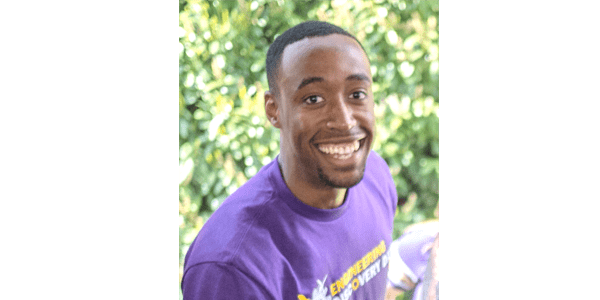Wilbert Copeland, a fifth year graduate student, works in the complex and relatively new discipline of synthetic biology – a field that seeks to embed organisms with novel, specific characteristics for use in medicine or industry. He is pursuing a specific niche application of synthetic biology: techniques to quantify and measure biologic phenomena to better predict cell behavior.
Wilbert’s research, under the direction of Herbert Sauro, associate professor of bioengineering, is aimed at discovering new ways to monitor RNA expression in living cells during the transcription process of gene expression. Messenger RNA,or “mRNA,” serves an important role in cell biology by carrying DNA information for making proteins to ribosomes, ultimately signifying gene expression. Understanding gene expression is crucial in understanding how healthy cells work and why diseased cells do not. Wilbert’s approach to monitoring mRNA expression is to use special RNA molecules called aptamers that bind to a dye. When the two bind, a red light is emitted, creating a specific, fast and accurate signal to indicate the presence or absence of a specific RNA molecule.
Wilbert’s work draws upon core principles of synthetic biology to offer potential solutions to problems posed by current studies of RNA expression. Currently, most studies cannot be performed on live populations of cells while also allowing for qualitative measurement, which makes monitoring for unique variations of single cells difficult. Wilbert’s efforts to study expression only works on live cells but offers the ability for precise quantitative measurement down to the single cell level. This technique can be used to predict the degree of gene expression by just looking at a DNA sequence. Additionally, these efforts could one day enable scientists to genetically engineer precise behaviors in organisms, such as producing therapeutics or detecting compounds.
Discovering the path to bioengineering
Wilbert has been immersed in science since an early age. He credits his father, an electrical engineer, with encouraging him to explore various scientific disciplines. He gained a specific interest in bioengineering when he heard a news report about a mechanical device that allowed soldiers to carry a lot more weight in combat environments without impacting their mobility. This, as well as reading “a lot of Michael Crichton books,” caused him to develop a curiosity about how engineering approaches might be used to solve biological problems that impact people.
He earned his bachelor’s degree in bioengineering at the University of California at San Diego. There, he gained broad exposure to the field through working in several different research labs. He explored diverse disciplines, such as biochemistry and neural engineering, before discovering systems biology.
When it came time to apply to graduate school, UW Bioengineering appealed to Wilbert primarily due to the strength in its systems, synthetic and quantitative biology faculty and its developing presence in the field. Through his years in the graduate program, he has come to appreciate the collaborative nature of the department, easy access to excellent faculty mentors and high quality research facilities. Outside the department, he found a place in the community offered by GO-MAP (Graduate Opportunities and Minority Achievement Program), a unit of the UW Graduate School that is committed to fulfilling the academic and social needs of students of color and students from other underrepresented groups. GO-MAP provided him his first fellowship, which led to his receipt of several subsequent fellowships; he is a current recipient of a UNCF/Merck Graduate Science Research Dissertation Fellowship and the Thomas J. and Barbara D. Cable Endowed Fellowship in Bioengineering. He has also enjoyed taking advantage of UW’s location in the heart of Seattle, which he describes as being “an awesome city” with a lot to offer.
A desire to give back
Wilbert was positively influenced by strong mentoring relationships during his undergraduate studies. As he spent time in different research labs trying to find his footing, he relied upon the guidance of graduate students and faculty mentors to help him discover a research project which was best suited to his interests and goals. His mentors also played a role in his decision to go to graduate school, and helped him realize that a graduate education was necessary for him to accomplish what he wanted to do in his career.
Here at UW, he strives to be the same kind of mentor that helped him at UCSD. He enjoys giving back to the academic community through the UW branches of LSAMP (Louis Stokes Alliance for Minority Participation) and HSC-MSP (Health Sciences Center Minority Student Program), and speaking to undergraduates on how to survive the rigor and challenges of academic study, with the goal to encourage students to do good work while also enjoying their time at UW. He also aims to help younger students discover bioengineering and synthetic biology through K-12 initiatives such as the UW College of Engineering’s Summer Math Academy and Engineering Discovery Days.
Looking forward
In his pursuit of synthetic biology, Wilbert has developed an interest in the broader field of computational biology. In this field, researchers seek ways to integrate experimentation and computer modeling to improve research outcomes. He explains that specific applications of computational biology, such as whole cell modeling, may one day have a significant impact on basic scientific research. Researchers who use such techniques may be able to develop research strategies much more quickly and at a lower expense than researchers working in a traditional laboratory environment can.
After graduation, Wilbert intends to work in industry and pursue a career in computational biology. He has gained experience in the field through an internship at Amgen, where he developed computational models to guide the manufacturing of pharmaceuticals with desirable attributes.


